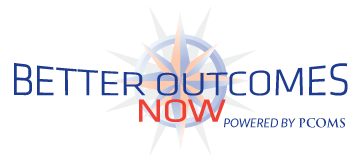July 25, 2022 08:00 AM
There is compelling evidence from randomized clinical trials (RCT) that routine outcome monitoring (ROM) improves outcomes and reduces dropouts. Although there are many ROM systems, only two systems have RCT support, Lambert’s Outcome Questionnaire System and Duncan’s Partners for Change Outcome Management System (PCOMS).

PCOMS has demonstrated improved outcomes with adults (Bovendeerd et al., 2021; Brattland et al.,2018; Reese et al., 2009; She et al., 2018), couples (Anker et al., 2009; Reese et al., 2010), children (Cooper et al., 2019), and with substance abuse clients (Schuman et al., 2015), in group therapy (Slone et al., 2015), and in integrated care (Duncan. et al., 2021). Eight of the ten RCTs that support PCOMS have been conducted by the Better Outcomes Now (BON) team of Duncan, Reese, Chapman, and colleagues. And only one system, PCOMS, privileges clients and promotes cultural humility and responsiveness.
The Bad News
But has practice caught up with the science of ROM in general, and PCOMS specifically? Unfortunately, no. A recent study (Jensen-Doss et al., 2018) of social workers, counselors, and marriage and family therapists (n = 504) delivered the bad news. Only 13.9% of participants reported the use of standardized progress measures (like the Outcome Rating Scale). Thus, consistent with prior studies of psychologists, these data indicate very low rates of ROM among social workers, mental health counselors, and marriage and family therapists.
Of course, many are using PCOMS. We have 40,000 registered users of the PCOMS measures, millions of administrations in our BON data base, and over 35 translations of the measures. But still, most are not, and it begs the question of why. Given so much research and real-world support of PCOMS, why do so many clinicians recoil at the idea of systematic client feedback. There are the reasons often reported and there are the more uncomplimentary answers about our field.
Why So Few?
Why do so few clinicians currently practice feedback informed therapy, measurement-based care, or whatever you want to call it? The reason most cited is feasibility. Most studies of ROM implementation cite barriers related to time of administration and overall burden to front-line staff. This is a somewhat hollow reason when it comes to PCOMS. Without a doubt, PCOMS offers the most feasible system for every day, every session use by therapists. Weighing in at only 4 items for outcome and 4 items for alliance, PCOMS is a minimal time investment for a return of better outcomes and client partnership. Also cited in addition to feasibility is the use of web-based technology and ongoing training and support. BON also has that covered.
The Less than Complimentary Reasons
Imagine that you are completely unaware of ROM or PCOMS. If someone told you that by having your clients answer four brief questions at the beginning and end of each session, you up to triple their chances of having a successful outcome, would you say: ‘Na, too much trouble?’ That’s exactly what PCOMS brings to the table and still, most therapists don’t do it.
Therapists who do not attempt ROM, and specifically PCOMS, besides the reasons of feasibility, work burden, and lack of exposure tend to fall in four overlapping categories. Of course, there are good therapists who just don’t resonate with PCOMS who don’t fall into these categories. First are those that PCOMS just doesn’t fit their view of psychotherapy. They see it as superficial and not about the real work of psychotherapy. PCOMS does not resonate with those who believe psychotherapy is about an ongoing processing of client experience combined with relational support, without an additional focus on meaningful change in the client’s day to day life that clients will both notice and report on outcome measures.
Second are the ones who think they are already terrific therapists. Based on what, you ask? Based on their own opinion, ego, and wishful thinking. A study of therapists found that most therapists believe that 85% of their clients benefit and that they are better than 75% of their colleagues. Talk about delusional! Actually, most therapists are about 50% effective. Most are decidedly average, and they go their entire career not knowing how effective they are. They remember the ones who benefit, not the ones who drop out or don’t benefit. Ignorance is bliss and so this group is not likely to try client feedback for fear of bursting their bubble.

Next are those who are enamored of the latest gimmicks of the field and insist on the veracity of their beloved approach without regard to whether there is any supporting evidence beyond the hustles of the hucksters promoting it. Critical thinking seems lost among professionals in search of narratives that make them feel they have special expertise. They ignore research and tend to think that their opinion or their personal experience matters most. Therapists following a fad without research support or who are married to a model tend not to be open to client feedback telling them their beloved is not of benefit.
Finally, the last overlapping group is the all-knowing, guru therapist who operates without client partnership beyond that of doctor/patient, expert/client. Instead of monitoring their results with their clients and changing treatment strategies as needed, they continue ineffective strategies and blame clients for the lack of change, because after all, they are the ones with the training. Instead of collaborating with clients to find ways to improve their quality of life, they pursue diagnostic explanations of why the client isn’t changing, often archeological expeditions looking for that all-encompassing trauma explanation, thinking that their insightful pronouncements will result in real change. Nothing wrong with historical or trauma approaches to psychotherapy, but doing therapy in a top-down, therapist-centric way is not conducive to wanting systematic client feedback.

Ask for a free trial today. Implement an evidence-based practice that includes clients as full partners, is responsive to cultural differences, identifies clients who are not benefiting, and truly lets you know how effective you are.





.png)


.png)